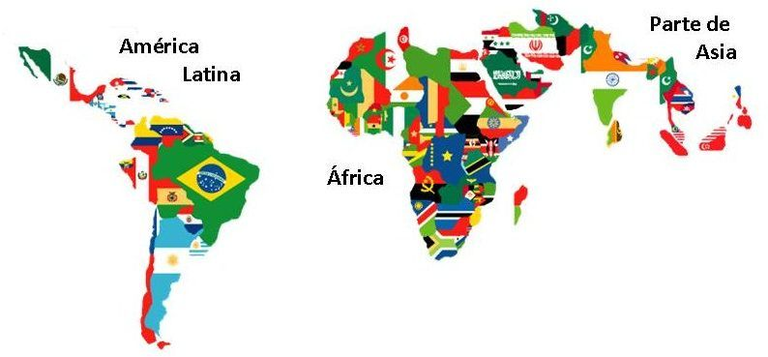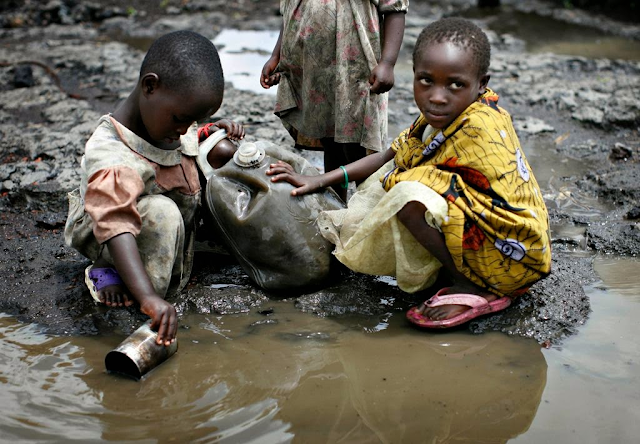
In his inaugural address as President of the United States on 20 January 1949, Harry Truman announced to the world his concept of "fair dealing". An essential component of the concept was his call to the United States and the world to solve the problems of the "underdeveloped areas" of the globe: More than half of the world's population lives in near-destitution. Their nutrition is inadequate, they are victims of disease. Their economic life is primitive and stagnant.
Their poverty is an obstacle and a threat both to them and to more prosperous areas. For the first time in history, humanity possesses the knowledge and the capacity to alleviate the suffering of these people... I believe that we should make available to the peace-loving people the benefits of our store of technical knowledge to help them achieve their aspirations for a better life... What we have in mind is a programme of development based on the concepts of fair and democratic treatment....
This is not so much because the Second World (the socialist economies of Eastern Europe) has disappeared and the holy trinity of the post-war world order is coming to an end, but because of the utter failure of development in terms of its own objectives, and thanks to the growing resistance and opposition to it by an increasing number of major social actors and movements. The voices calling for the end of development as a historical experiment that has come to an end are growing every day.

We hope that in trying to write its obituary, as we intend to do here together with other studies that share the present approach, we contribute to imagining alternatives, changes of course, other ways of representing and designing our multiple realities without reducing them to a single pattern or a hegemonic cultural model.
Is it possible to imagine such a post-development era in contexts of globalisation of economic and cultural production? We think so. On the one hand, the internationalisation of the economy cannot be denied; but the so-called "openings" in Latin America do not show any imagination; they are in general a poor adaptation to the neoliberal recipes devised in other latitudes; they benefit capitalists and dominant sectors of the world and harm workers, the environment, the subalterns and different cultures.
It is necessary to rethink the conditions for participation in transnational spaces. On the other hand, while techno-scientific expansion is irreversible, it does not have to be catastrophic for popular groups and the environment. How is it possible to alter its purposes and modes of operation? This requires inventing social practices that link social, economic and political processes with techno-scientific transformations, artistic-cultural creations, and efforts to overcome the serious socio-economic problems that affect the majority of the population. Today, all political systems are engaged in this task, which involves the invention of subjective identities, of other surfaces of life, truly new existentialist territories.
In short, new ways of organising social, economic and cultural life can be imagined; economic and technological systems can be reoriented. Not only the paranoid will of those in power - capitalists, drug traffickers, conventional politicians, violent people of all kinds - can capture collective desires; these can also be modified by liberating projects. In countries such as Colombia, the so-called "kindergartens" of young politicians have failed not because they are young, but because they have surrendered their capacity for imagination to the status quo. This conceptual poverty is often opposed by the activity of those who, like some social movements and dissident intellectuals, see in the economic and techno-scientific not the material for a further irresponsible adventure in development but the possibility of inventing new ways of being free. This is what we call post-development.

En su discurso de posesión como presidente de Estados Unidos el 20 de enero de 1949, Harry Truman anunció al mundo entero su concepto de “trato justo”. Un componente esencial del concepto era su llamado a Estados Unidos y al mundo para resolver los problemas de las “áreas subdesarrolladas” del globo: Más de la mitad de la población del mundo vive en condiciones cercanas a la miseria. Su alimentación es inadecuada, es víctima de la enfermedad. Su vida económica es primitiva y está estancada.
Su pobreza constituye un obstáculo y una amenaza tanto para ellos como para las áreas más prósperas. Por primera vez en la historia, la humanidad posee el conocimiento y la capacidad para aliviar el sufrimiento de estas gentes… Creo que deberíamos poner a disposición de los amantes de la paz los beneficios de nuestro acervo de conocimiento técnico para ayudarlos a lograr sus aspiraciones de una vida mejor… Lo que tenemos en mente es un programa de desarrollo basado en los conceptos del trato justo y democrático.
Esto ocurre no tanto porque el Segundo Mundo (las economías socialistas de Europa del este) haya desaparecido y la sagrada trinidad del orden mundial de la posguerra esté llegando a su fin, sino por el fracaso rotundo del desarrollo en términos de sus propios objetivos, y gracias a la creciente resistencia y oposición a él por parte de un número cada vez mayor de actores y movimientos sociales de importancia. Las voces que claman por el fin del desarrollo como experimento histórico que ha llegado a su fin crecen cada día.

Confiamos en que al tratar de escribir su obituario, como pretendemos aquí junto a otros estudios que comparten el presente enfoque, contribuimos a imaginar alternativas, cambios de rumbo, otras formas de representar y diseñar nuestras múltiples realidades sin reducirlas a un patrón único ni a un modelo cultural hegemónico.
¿Es posible imaginar una era posdesarrollo de este tipo en contextos de globalización de la producción económica y cultural? Pensamos que sí. Por un lado, la internacionalización de la economía no puede ser negada; pero las llamadas “aperturas” en América Latina no exhiben ninguna imaginación; son en general una adaptación pobre a las recetas neoliberales ideadas en otras latitudes; benefician a capitalistas y sectores dominantes del mundo y perjudican a los trabajadores, al ambiente, a los subalternos y a las culturas diferentes.
Se impone repensar las condiciones para participar en los espacios transnacionales. Por otro lado, si bien la expansión tecnocientífica es irreversible, no tiene que ser catastrófica para los grupos populares y el ambiente. ¿Cómo es posible alterar sus finalidades y modos de operación? Esto requiere inventar prácticas sociales que relacionen los procesos sociales, económicos y políticos con las transformaciones tecnocientíficas, las creaciones artístico-culturales, y los esfuerzos por superar los graves problemas socioeconómicos que afectan a la mayoría de la población. Hoy en día, todos los sistemas políticos están abocados a esta tarea, la cual supone la invención de identidades subjetivas, de otras superficies de vida, verdaderamente nuevos territorios existencialistas.

Initial image / Imagen Inicial: Unsplash by ia huh
Final image / Imagen final: Unsplash by Larm Rmah
Y como siempre me despido de todos con un:
And as always I bid you all farewell with a:

Mis Blogs y Sitios Web / My Blogs & Websites:
- La Cucina di Susana.
- Cucinando con Susana
- El Mundo de los Postres
- Crónicas de Un Mundo en Conflicto.

Upvoted. Thank You for sending some of your rewards to @null. Get more BLURT:
@ mariuszkarowski/how-to-get-automatic-upvote-from-my-accounts@ blurtbooster/blurt-booster-introduction-rules-and-guidelines-1699999662965@ nalexadre/blurt-nexus-creating-an-affiliate-account-1700008765859@ kryptodenno - win BLURT POWER delegationNote: This bot will not vote on AI-generated content
Thanks!